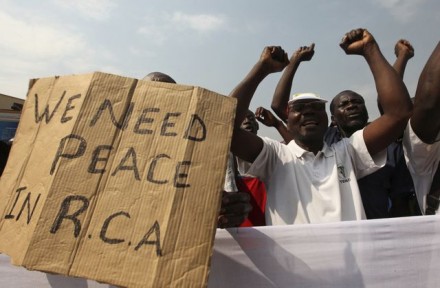Blog post today from our friends at The Resolve LRA Crisis Initiative addressing the significant danger that the Central African Republic could become a true safe haven for the LRA.

Traders demonstrate near the presidential palace in Bangui January 5, 2013. The U.N. Security Council voiced alarm on Friday at an advance by rebels in Central African Republic that has brought them within striking distance of the mineral-rich nation’s capital, and renewed its call for a negotiated solution to the crisis. REUTERS/Luc Gnago
A violent change of government that took place in the Central African Republic over the weekend could lead to the withdrawal of Ugandan and US forces working to track down LRA groups in the eastern part of the country. The departure of Ugandan and US forces from CAR, which are operating there under an authorization from the African Union and with permission from the previous CAR government, would create a security vacuum in LRA-affected areas and allow the reversal of significant gains made against the LRA in recent years.
The “Seleka” coalition, as it is known, seized control of the capital city of Bangui on Sunday. One of the rebel leaders, Michel Djotodia (profiled here), has claimed the Presidency while deposed President Francoise Bozize has fled to Cameroon. Seleka is a combination of five different CAR rebel groups that emerged in December of 2012 with claims that the central government had not delivered on promises made in previous peace agreements.
Seleka representatives previously called for the exit of all “foreign forces” from CAR. While they are likely focused most on the Chadian, South African, and other forces from neighboring countries that deployed in a (failed) effort to protect the former regime, there are indications they may ask Ugandan and US forces, which operate only with permission from the central government, to leave as well. A senior Seleka leader recently called publicly for the Ugandans to leave, though Ugandan and US government sources indicated to us that no formal request for their departure has been made since Seleka seized power.
The Ugandans have pursued the LRA in CAR, with some success, since 2009. In 2011, the African Union provided a political mandate for regional operations against the LRA and the US sent military advisors to support the Ugandan-led efforts. During this time, LRA attacks, killings, and abductions of civilians have declined significantly, and defections from LRA ranks have surged.
The withdrawal of Ugandan and US forces now – or any time before Joseph Kony is captured and the group’s command structure fully dismantled – could reverse these gains. The Ugandan-led military operations have weakened the LRA and prevented them from being able to integrate many of the civilians they abduct into their ranks. Without military pressure, Kony could rebuild much of the capacity that the LRA has lost over the past several years. And with no alternative forces that can pursue the LRA or provide protection, civilians in LRA-affected areas – who have largely welcomed the Ugandan and US deployments – would be left more exposed to LRA attacks.
One of Seleka’s member groups, the UFDR, itself clashed with the LRA back in 2010, and a field interview we conducted with a UFDR representative in 2011 suggested they view the LRA with extreme hostility. However, the UFDR may have received some support for its rebellion from the Government of Sudan (as many civil society leaders in eastern CAR believe and this 2007 HRW report alleges), which has an interest in seeing its longtime enemy Uganda depart from its backyard in CAR. In 2010, disputes between Ugandan and UFDR forces over control of diamond mines in the town of Sam Ouandja (Ugandan forces were allegedly preventing the UFDR from exploiting the illegal diamond trade, though this is disputed) also led to the Ugandans being forced to leave that town.
All this to say: there is cause for concern that the political upheaval in CAR could deal a devastating setback for international efforts to end LRA atrocities. In the short term, there is no alternative to the Ugandan-led, US-supported operations that could realistically hope to address the LRA’s threat to civilians. As international leaders engage with the newly installed CAR government to help reestablish some semblance of security and democratic governance in the country, they should urge cooperation with the African Union-authorized regional counter-LRA mission and allow Ugandan and US forces to stay put.
– Michael
